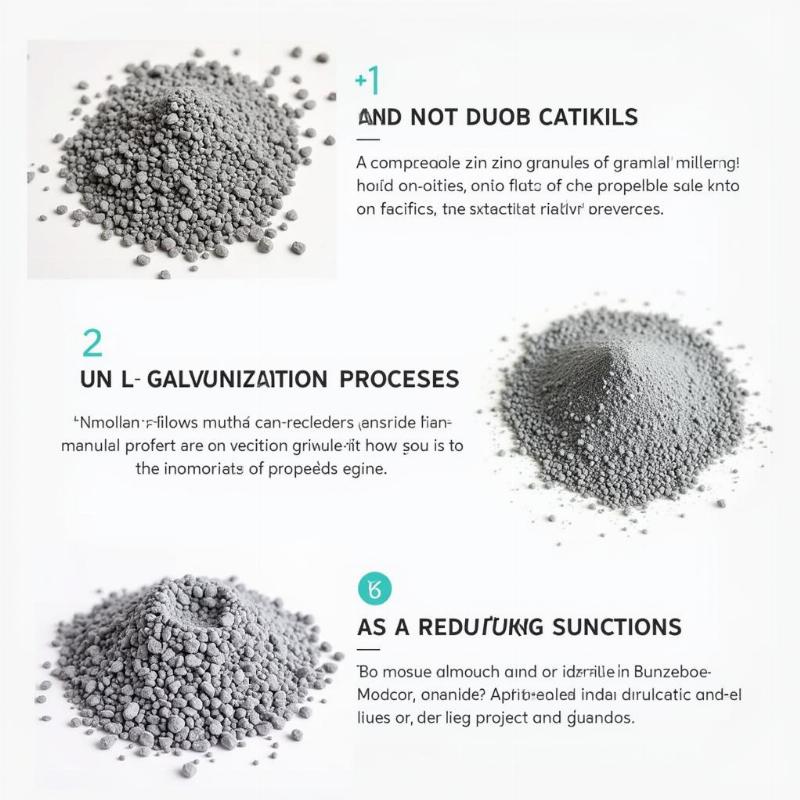When a recipe calls for zinc dust instead of zinc granules, it signals a need for a faster, more reactive form of zinc. This seemingly small substitution can significantly impact the outcome of your experiment or chemical process. Understanding why zinc dust is used in place of zinc granules opens a window into the fascinating world of chemical reactivity and its practical applications. This article explores the differences between these two forms of zinc, why one might be preferred over the other, and the safety considerations involved.
Why Choose Zinc Dust Over Granules?
The primary reason for using zinc dust instead of zinc granules lies in its increased surface area. Imagine a large block of cheese versus grated cheese. The grated cheese has significantly more surface area exposed, allowing it to melt faster and more evenly. Similarly, the fine particles of zinc dust offer a much larger surface area compared to the coarser zinc granules. This increased surface area translates to a higher reactivity, making zinc dust ideal for reactions requiring a faster and more vigorous response.
Reactivity and Applications
The enhanced reactivity of zinc dust makes it a preferred choice in various applications. For instance, in organic synthesis, zinc dust is often used in reactions like the Reformatsky reaction and Clemmensen reduction. In these reactions, the high surface area of zinc dust facilitates efficient electron transfer, leading to the desired product. Similarly, in the production of certain batteries and coatings, the fine particles of zinc dust provide a uniform and reactive surface.
Understanding the Properties of Zinc Dust
Zinc dust is a bluish-gray powder composed of finely divided zinc particles. Its small particle size contributes to its pyrophoric nature, meaning it can ignite spontaneously in air. This characteristic necessitates careful handling and storage of zinc dust, especially in large quantities.
Safety Precautions
Given its pyrophoric nature, it’s crucial to handle zinc dust with caution. Always store it in airtight containers away from heat and open flames. Avoid dispersing the dust in the air, as this can create a fire hazard. When working with zinc dust, wear appropriate personal protective equipment, including gloves and eye protection.
When Are Zinc Granules Preferred?
While zinc dust offers advantages in terms of reactivity, zinc granules have their place. In applications where a slower, more controlled reaction is desired, granules might be the better choice. For example, in some laboratory experiments and industrial processes, the slower reaction rate offered by granules allows for better control over the reaction progress.
 Zinc Granules Applications
Zinc Granules Applications
Zinc Dust vs. Zinc Granules: A Summary
The choice between zinc dust and zinc granules ultimately depends on the specific requirements of the application. While zinc dust offers higher reactivity due to its increased surface area, zinc granules provide a slower, more controlled reaction. Understanding these differences allows for informed decisions regarding which form of zinc is best suited for a given task.
Conclusion: Choosing the Right Zinc for Your Needs
Choosing between zinc dust and zinc granules involves a careful consideration of reactivity and safety. While in place of zinc granules, zinc dust is often taken for its enhanced reactivity, it’s crucial to handle it with caution due to its pyrophoric nature. By understanding the properties and applications of each form, you can make an informed decision that ensures both effectiveness and safety.
FAQs
- What is the main difference between zinc dust and zinc granules? The primary difference lies in particle size and surface area. Zinc dust has much smaller particles and a significantly larger surface area, resulting in higher reactivity.
- Why is zinc dust more reactive than zinc granules? The increased surface area of zinc dust exposes more zinc atoms to reactants, facilitating faster and more vigorous reactions.
- Is zinc dust dangerous? Zinc dust can be hazardous due to its pyrophoric nature. Proper handling and storage are essential to prevent fires.
- What precautions should I take when handling zinc dust? Store zinc dust in airtight containers away from heat and open flames. Wear appropriate personal protective equipment, such as gloves and eye protection.
- Can zinc granules be used as a substitute for zinc dust? While possible in some cases, substituting granules for dust may alter the reaction rate and outcome. Careful consideration is necessary.
- Where can I purchase zinc dust and zinc granules? Chemical supply companies and online retailers typically sell both forms of zinc.
- What are some common applications of zinc dust? Zinc dust is used in organic synthesis, battery production, and coatings, among other applications.
PlaTovi, your trusted travel companion, offers a range of services to make your travel dreams a reality. From traditional package tours to customized itineraries, we handle everything from flights and accommodation to visa assistance and airport transfers. Whether you’re planning a cultural exploration of India or an international adventure, PlaTovi is here to assist you. Contact us at [email protected] or call us at +91 22-2517-3581 to learn more about our services and how we can help you plan your next unforgettable journey.